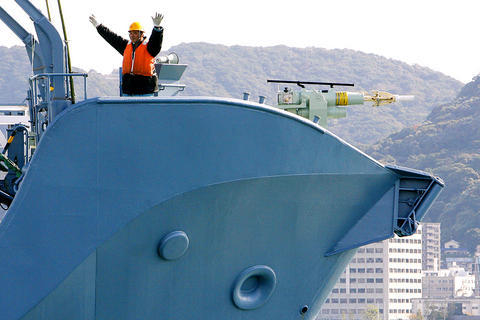Japan's whaling fleet set off yesterday towards the Antarctic Ocean for a hunt that will include famed humpback whales for the first time, defying Western protests that the move will inflame tensions.
Japan argues that whale populations have recovered enough to allow a managed catch, but environmentalists have vowed in turn to "hunt the whalers" to save the humpbacks.
The fleet took off for its five-month voyage after a ceremony in the western port town of Shimonoseki that included the head of Japan's Fisheries Agency, an official said.

PHOTO: AP
The fleet is led by the 8,044-tonne Nisshin Maru, which has been repaired since a fire that forced Japan to cut short its last Antarctic hunt.
The environmental movement Greenpeace said that its Esperanza ship is waiting outside Japanese coastal waters and will track the whalers in Antarctic waters, shooting video to show the public.
"The threatened humpbacks targeted by the whalers are part of thriving whale watching industries elsewhere," Greenpeace expedition leader Karli Thomas said in a statement issued aboard the Esperanza.
"The whaling fleet must be recalled now. If it is not, we will take direct, non-violent action to stop the hunt."
Japan kills more than 1,000 whales a year in the Antarctic and also the Pacific Ocean using a loophole in an international moratorium that allows catching whales for research. Only Norway and Iceland defy the moratorium outright.
This year, Japan is expanding the catch to include 50 humpback whales, which are celebrated for their complex songs and acrobatic displays.
The expedition also plans to kill 50 fin whales -- the world's second largest animal after blue whales -- as well as 850 smaller minke whales.
It will be the first time that Japan has hunted humpback whales since an international moratorium on the species took effect in 1966 because of overhunting. The former Soviet Union also defied the moratorium.
Western conservationists say that humpback and fin whale populations are still vulnerable. Australia has warned that killing humpbacks would seriously worsen an already bitter feud with Japan on whaling.
Humpbacks migrate northwards along Australia's coast to breed each year. Their slow and majestic progression each year draws some 1.5 million whale watchers, pumping US$225 million into Australia's economy.
"It's important that Japan understands that the inclusion of humpbacks will have an impact on perceptions of Japan in Australia," Australian Environment Minister Malcolm Turnbull said earlier this year.
Japan counters that Western nations are insensitive to its culture and that whale populations are recovering.
Japan makes no secret that the whale meat goes onto dinner plates and also says that "lethal research" helps keep data on the giant mammals.

CALL FOR SUPPORT: President William Lai called on lawmakers across party lines to ensure the livelihood of Taiwanese and that national security is protected President William Lai (賴清德) yesterday called for bipartisan support for Taiwan’s investment in self-defense capabilities at the christening and launch of two coast guard vessels at CSBC Corp, Taiwan’s (台灣國際造船) shipyard in Kaohsiung. The Taipei (台北) is the fourth and final ship of the Chiayi-class offshore patrol vessels, and the Siraya (西拉雅) is the Coast Guard Administration’s (CGA) first-ever ocean patrol vessel, the government said. The Taipei is the fourth and final ship of the Chiayi-class offshore patrol vessels with a displacement of about 4,000 tonnes, Lai said. This ship class was ordered as a result of former president Tsai Ing-wen’s (蔡英文) 2018

‘SECRETS’: While saying China would not attack during his presidency, Donald Trump declined to say how Washington would respond if Beijing were to take military action US President Donald Trump said that China would not take military action against Taiwan while he is president, as the Chinese leaders “know the consequences.” Trump made the statement during an interview on CBS’ 60 Minutes program that aired on Sunday, a few days after his meeting with Chinese President Xi Jinping (習近平) in South Korea. “He [Xi] has openly said, and his people have openly said at meetings, ‘we would never do anything while President Trump is president,’ because they know the consequences,” Trump said in the interview. However, he repeatedly declined to say exactly how Washington would respond in

WARFARE: All sectors of society should recognize, unite, and collectively resist and condemn Beijing’s cross-border suppression, MAC Minister Chiu Chui-cheng said The number of Taiwanese detained because of legal affairs by Chinese authorities has tripled this year, as Beijing intensified its intimidation and division of Taiwanese by combining lawfare and cognitive warfare, the Mainland Affairs Council (MAC) said yesterday. MAC Minister Chiu Chui-cheng (邱垂正) made the statement in response to questions by Democratic Progressive Party (DPP) Legislator Puma Shen (沈柏洋) about the government’s response to counter Chinese public opinion warfare, lawfare and psychological warfare. Shen said he is also being investigated by China for promoting “Taiwanese independence.” He was referring to a report published on Tuesday last week by China’s state-run Xinhua news agency,

‘ADDITIONAL CONDITION’: Taiwan will work with like-minded countries to protect its right to participate in next year’s meeting, the foreign ministry said The US will “continue to press China for security arrangements and protocols that safeguard all participants when attending APEC meetings in China,” a US Department of State spokesperson said yesterday, after Beijing suggested that members must adhere to its “one China principle” to participate. “The United States insists on the full and equal participation of all APEC member economies — including Taiwan — consistent with APEC’s guidelines, rules and established practice, as affirmed by China in its offer to host in 2026,” the unnamed spokesperson said in response to media queries about China putting a “one China” principle condition on Taiwan’s